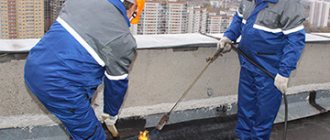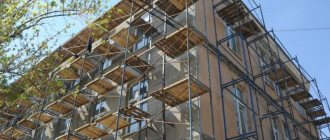Innovations in legislation are practiced annually and they relate to many areas of citizen activity. Thus, one of the innovations of 2012 was the law on the overhaul of apartment buildings. According to the standard, all owners of square meters in the Moscow Railway are required to make contributions to the upcoming capital project. Since the amounts of contributions are considerable, these additional penalties aggravated the situation with paying for utilities. Citizens who are unable to pay housing and communal services in full began to simply avoid paying additional charges. But, since contributions are required to be transferred, penalties for major repairs are charged for failure to repay them.
Overhaul program, legal basis for calculating penalties for overhauls, Article 155 of the Housing Code of the Russian Federation
The capital repair program includes a set of activities that are aimed at thorough repairs of common property in an apartment building (MCD). Similar programs operate in every region of the country.
To carry out such repairs, considerable funds are needed, which are paid by apartment owners in apartment buildings without fail on the basis of paragraphs 5 and 6 of Article 155 of the Housing Code of the Russian Federation. If they do not pay this contribution, then they are charged a penalty. Its accrual for non-payment or late payment is enshrined in clause 14.1 of Article 155 of the Housing Code of the Russian Federation.
Contribution amount
Different constituent entities of the Russian Federation, in accordance with their legislation, have their own contribution amounts for major repairs, so it is impossible to give a specific figure. However, we can tell what this size consists of. The cost is determined taking into account:
- Tariffs adopted in a particular region.
- Living area.
- Availability of debt on these contributions.
Who should pay
According to Article 210 of the Civil Code of the Russian Federation, the owner bears the burden of maintaining the property he owns, and according to Art. 169 of the Housing Code of the Russian Federation, owners of apartments in apartment buildings are required to pay the appropriate fees for repairs. It turns out that the tenants who own the apartments must pay.
Such payments are also required to be made by homeowners who do not live in the apartment or are temporarily absent.
Who may not pay
As mentioned above, homeowners must pay fees, however, there are certain categories of citizens who may not do this. Such citizens include:
- Citizens who have the right of ownership of housing in an apartment building recognized as unsafe and subject to demolition.
- Pensioners over 80 years of age and those living with them.
- Owners in MKD if the land on which the house stands is seized for municipal or state needs.
How, where and when to pay
Payment for major repairs is made monthly. And since this fee is included in payments for utility services, then, according to paragraph 1 of Article 155 of the Housing Code of the Russian Federation, it must be paid before the 10th day of the month, unless a different period is established by the contract. The amount is paid, as a rule, to regional capital repair funds, but money can also be deposited into the accounts of other organizations engaged in similar activities. It all depends on who the contract is concluded with.
Paying for major repairs is quite simple. This happens on the basis of a receipt where the details are indicated. You can send money either through a bank during a personal visit, through self-service terminals, or use online services, for example, Sberbank Online.
The owner of the premises did not receive information or notifications about the existence of the debt
The Supreme Court of the Russian Federation also agreed with the position of the courts that no receipt means no penalty for non-payment. In case No. A40-15611/2017, the Supreme Court of the Russian Federation indicated that in the absence of a payment document, the consumer has no way to find out about the debt.
In this case, the management company tried to collect from the owner a fee for the maintenance and servicing of a parking space in an apartment building, including penalties for the amount of the debt. The court found that the management organization did not provide the owner of the parking space in the apartment building with an invoice for paying utility bills and did not notify him of the debt for 2.5 years. In such a situation, the company has no right to demand that the owner pay a penalty in the amount of the debt incurred before the defendant received the receipt.
Why should the owner pay for housing and communal services even in the absence of an invoice?
What are the consequences of failure to pay for major repairs, liability?
Residents who do not pay for major repairs and have debts for them are called debtors. This status leads to certain consequences in the form of sanctions, namely to the fact that, first of all, in payment documents a person sees, in addition to the monthly amount, also his debt with accrued penalties. In this case, penalties act as a stimulant for debt repayment. The organization that services a specific apartment building has the right to charge penalties.
If the situation does not change, and the tenant still does not pay off the debt, then the amount of debt can accumulate for some time until it reaches the size when the providing organization goes to court. And then everything is simple. The court will make a decision to collect a certain amount and send a writ of execution to the bailiffs, and they have their own ways of getting the money. Starting from the seizure of bank accounts or withdrawal of money from them, ending with a ban on leaving the country.
Penalties cannot be called a fine, since they act more like a type of penalty for late payment.
How are penalties calculated?
As mentioned above, penalties are charged for violating the procedure for paying for major repairs. This may include non-payment, incomplete payment or violation of deadlines for depositing funds. To calculate the accrual amount, a special formula is used:
Amount of penalties/interest = Amount of debt * Central Bank refinancing rate/ 300.
This amount will be calculated after the day on which the payment was due, for each day of delay.
Penalty calculator for major repairs online
The above formula is not required for use, since many special calculators for calculating penalties can be found on the Internet. They are a small window where you need to specify some parameters for major repairs, and then simply click on the “Calculate” button and get the amount of the penalty.
Below you see one of these tools and you can use it!
Calculator from Dogovor-Yurist.Ru
Major renovations in a cooperative building
Protecting your Rights is our job! Legal advice Until this moment, the owners contribute funds according to the previous scheme, and after its adoption they will have to pay in a new way. According to the old procedure, the decision to overhaul a house is made at a general meeting of owners.
They decide for themselves whether to raise money only for specific work or to form a certain capital and spend it as problems arise. Under the new order the situation is different. Major renovation of a cooperative house “According to Art. 16 of the Law of the Russian Federation “On the privatization of housing stock in the Russian Federation” privatization of residential premises occupied by citizens in houses requiring 02/03/2012 Good afternoon! In an apartment building from the 80s. built since November 2012 problems with the supply of hot water (due to the lack of filters in the boiler, the pipes are slagged).
How to write off penalties for major repairs
There are several grounds that will allow you to write off accrued penalties in full or in part for major repairs. These include:
- The statute of limitations has expired. In order to use this basis, you will have to visit the court on the defendant’s side and declare that the statute of limitations has expired. This option should be used if accruals continue for more than 3 years. The security company will only be able to recover the money within a 3-year period.
- Bankruptcy of individuals faces. The basis is quite difficult to use, since you will have to confirm bankruptcy, and this procedure is not easy and not the fastest.
- Termination of the existence of the organization receiving contributions.
- Agreement with the providing organization on the write-off of penalties. Few organizations will agree to this option; it is easier for them to extract the amounts through the court, but you can try. You can try to conclude such an agreement with the condition that you pay all the debt on capital contributions at once, and the penalties will be written off.
- Difficult life circumstances. This option is already used in court proceedings, since the court usually takes into account the living situation of the parties. Therefore, for example, a serious illness may serve as a basis for writing off part of the penalty.
Application for cancellation
Penalties may be written off to you in whole or in part, but they cannot be removed completely, since this is an obligation enshrined in law, which occurs for violating the procedure for paying capital contributions. Therefore, residents making these contributions will be required to pay penalties if they commit violations.
Therefore, you need to write an application not for the cancellation of penalties, but for the cancellation of contributions for major repairs. Moreover, you can write to both the providing organization and
. However, it is unlikely that this will be possible, because the contribution is considered mandatory.
How to spend money?
The company that wins the auction draws up a major renovation project and, as soon as it is approved, implements all the specified work on communications inside the house and on the territory related to this house. In this way, it is possible to install, for example, devices for metering the consumption of resources in a building. The fund withdraws money from the amount paid by the owners and settles with the contractor.
Contributions for major repairs paid by the owners of territories in a residential building are accumulated in the fund of the registered region where the building is being built. There are regional funds that work with contractors, organize tenders and create lists of organizations capable of completing the work. They have the right to operate only in their region.
Arbitrage practice
An analysis of judicial practice on this issue shows that the court almost always sides with capital repair funds. Let's look at a few court cases:
- The plaintiff, who is the owner of housing in an apartment building, filed a lawsuit against the capital repair fund, demanding that its actions be declared illegal and the accrued penalties cancelled. The plaintiff, having received a receipt for payment of rent, saw that a new type of service had been added there, namely cap. repairs, however, all work, namely capital ones, according to the contract must be carried out by the developer of the apartment building until a certain date. The court sided with the plaintiff and declared the fund’s actions illegal and wrote off all accrued penalties.
- Fund cap. repair company filed a lawsuit against the tenant of the apartment building with a demand to collect the arrears of contributions along with penalties. And besides, for utilities, which the defendant did not pay. During the court hearing, it turned out that the amount of the penalty was incorrectly calculated, and the period of non-payment was also incorrectly indicated. Based on this, the court refused to satisfy the fund’s demands for debt collection and penalties for major repairs. He satisfied the remaining demands.
Payment for major repairs - mandatory contributions from owners established by the state. Payment amounts are set independently in each region. Violation of the payment procedure entails the accrual of a penalty, one of the types of penalties. In the future, it may come to court proceedings.
Penalties can be written off completely or only part of them, but they cannot be canceled!
What to pay and how much?
In order to pay money, which will then be used to repair the facade, roof, communications, you must first receive a receipt. It tells you how much money should be given away. In short, the system is similar to the one by which usual services are paid: water, gas, heat. You can pay either through special cash desks or through a bank or post office. The easiest option is to use your personal account in the online version of your bank. However, you need to carefully enter the details so that the payment goes where it is needed.
How large a figure the owner will see on the receipt is determined by the following factors:
- area of housing owned;
- regional tariff;
- presence of debt.
In many regions the tariff is about five rubles per square meter. The region's Federal Financial Markets Service can provide accurate information at any time. Specialists are obliged to clearly explain to everyone what the base rate is, what factors play a role, how you can pay and by what time it will have to be done, as well as the answer to questions about why this money is paid and what benefit it will bring to the owner.









